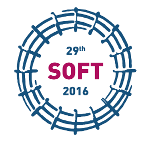Speaker
Yongbo Wang
(Lappeenranta University of Technology)
Description
For ITER or the future DEMO remote maintenance system (WPRM), several types of special tailored automatic manipulators are needed for vacuum vessel (VV) component transportation, inspection, and removal from and replacement to the VV wall. These tailored manipulators, such as Multi-purpose Deployer, Articulated Inspection Arm (AIA), Diverter Cassette Mover etc., should be calibrated with very strict tolerance so as to handle the very large and heavy components going through the narrow gaps. The accuracy of automatic manipulator equipment depends not only on how accurate of its machining and assembling processes but also on how accurate of its control model can reflect its actual structures. For a remote maintenance manipulator, due to its specific design with big size, big payload and high environment temperature, both the static and dynamic error sources should be considered in order to improve the manipulator accuracy.
In this paper, the accuracy improvement issues regarding to different robots are investigated, the static and dynamic error sources are taken into account for improving robot accuracy. The comparison results would answer the question of what is the relative importance of robotic static errors compared to dynamic errors. A 6-DOF (degrees of freedom) commercial industrial serial robot and a 10-DOF redundant hybrid ITER welding/cutting robot (IWR) at Lappeenranta University of Technology are used to carry out the corresponding simulation and experimental studies. This paper mainly focus on the general case studies, the results found in this research would be expected to form the basis of the proposed future connection with the work undertaken to support the ITER or the future DEMO remote handling systems.
Co-authors
Bingyan Mao
(Lappeenranta University of Technology, Lappeenranta, Finland)
Heikki Handroos
(Lappeenranta University of Technology, Lappeenranta, Finland)
Huapeng Wu
(Lappeenranta University of Technology, Lappeenranta, Finland)
Jing Wu
(Lappeenranta University of Technology, Lappeenranta, Finland)
Ming Li
(Lappeenranta University of Technology, Lappeenranta, Finland)
Yongbo Wang
(Lappeenranta University of Technology, Lappeenranta, Finland)

